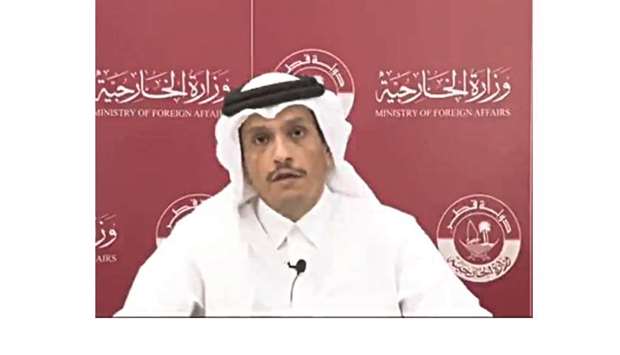HE the Deputy Prime Minister and Minister of Foreign Affairs Sheikh Mohamed bin Abdulrahman al-Thani has said that global governance requires a continuous commitment throughout the year to the principles of international law and the requirements of friendly relations between states, on the basis of sovereign equality, good neighbourliness, pluralism, as well as international and regional co-operation.
Addressing the 13th Ministerial Meeting of the Global Governance Group (3G), HE Sheikh Mohamed expressed Qatar’s thanks to Singapore for leading the 13th Ministerial Meeting of the Global Governance Group and hosting this dialogue with the members of the G20 Tripartite Committee, on the sidelines of the 75th session of the United Nations General Assembly.
He said that the co-operation between the United Nations, the G20 and the Global Governance Group is extremely important and essential in the pursuit of effective international co-operation, global solidarity and comprehensive global governance, in the face of the common challenges the world faces today.
HE Sheikh Mohamed added that, “there is no doubt that meeting and exchanging views at a time when we are witnessing extraordinary events is necessary. However, we believe that the principle of global governance requires a continuous commitment throughout the year, including adherence to the principles of international law and friendly relations between countries on the basis of sovereign equality, good neighbourliness, pluralism, international and regional co-operation. We also believe that it is necessary to continue co-operation and co-ordination for the common good of present and future generations.”
He noted that the current global threats and challenges, foremost of which is the coronavirus pandemic, clearly reminds us of the close interconnectedness among all of us, saying: “None of us will be safe unless everyone is safe, and this interconnectedness represents a strong argument confirming that global governance and pluralism are indispensable to confront the global threats and to achieve the general interest of all. It also reminds us of the central role of the United Nations in these joint efforts, and this was one of the main messages contained in the declaration adopted by world leaders on Monday on the occasion of the 75th anniversary of the United Nations”.
HE Sheikh Mohamed stressed that the Covid-19 pandemic can be contained only through a co-ordinated multilateral response and co-operation at an unprecedented level.
This includes doubling down on international obligations to prevent, detect and responding to infectious diseases.
To achieve this vision, Qatar has allocated $88mn to support the response to the Covid-19 pandemic in more than 88 countries around the world.
Meanwhile, HE Sheikh Mohamed also stressed the importance of fair and equitable access to safe and effective vaccines against the coronavirus to control the pandemic.
To this end, Qatar has allocated $20mn to the Global Alliance for Vaccines and Immunisation, to enhance research and clinical tests for vaccines and drugs.
Qatar also pledged to provide $10mn to the World Health Organisation to support the provision of testing and treatment devices.
HE Sheikh Mohamed also expressed pride at supporting the unique campaign, “Global Goal: Unite For Our Future”, which aims to put the world back on the right track to achieve the UN Sustainable Development Goals, noting that the initiative has succeeded in mobilising huge commitments from various sections.
He also added that Qatar is committed to the call of the UN Secretary-General to make recovery from the Covid-19 pandemic a real opportunity to improve performance in the future. He considered the Covid-19 pandemic an unprecedented warning bell, as it made clear some of the obstacles facing development that have been addressed in the 2030 Agenda for Sustainable Development and the Paris Climate Change Agreement.
He highlighted the urgent need to work closely together in co-operation with the United Nations and the G20 to reduce the economic and social damage caused by the pandemic, enhance resilience and to achieve the goals of the 2030 Agenda and the Paris Agreement.

HE Sheikh Mohamed bin Abdulrahman al-Thani
